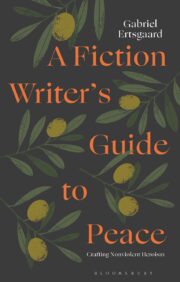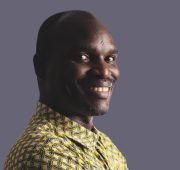Seven Days on Skokholm: Part Five
by Sylvia Spruck Wrigley
(Part One can be found here.)
The next morning, I still feel terrible for being so stupid and blind and for not paying attention. I don’t want to be that person who thinks the rules don’t apply to her. I lock myself into the hide in the Well and berate myself. It’s people like me that get these places closed down, tourists shut out because they just can’t be trusted. I’m not much of an ecologist but seriously… how difficult can it be to spend a week on a nature reserve without actually breaking it? That’s all I want, is to leave it as I found it. And maybe to actually have some words to show for myself.
I retreat to the hide at the Well and hang my phone out for a connection to the rest of the world.
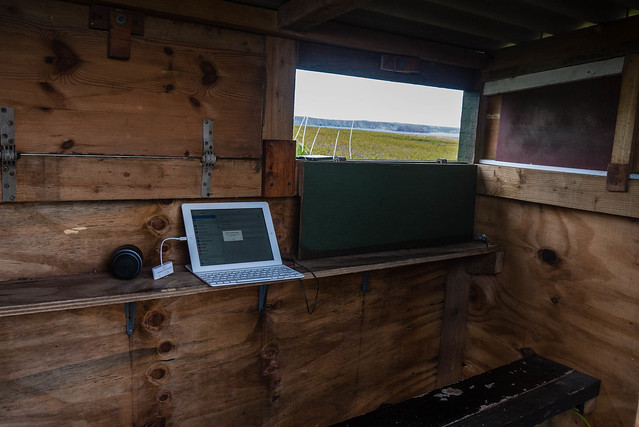
The seventeen-year-old writer has emailed me again. Her words break through my despair.
What you said about doing crazy things was different from any other advice about writing I’ve ever gotten. I love this new idea that if you want to change how you write, you should change how you live.
I swallow hard. The stories I’ve been working on are about heists and data protection and cyber-hacking. But that’s not what I want to be writing about. I want to write about hurting. I want to write about failing even when I’m trying so goddamn hard it’s killing me. I try write about myself, at first, about the shearwater and the island and the sadness. But that feels like cheating, like not-useful-words.
I write instead about my beloved fairies, about how bumbling people simply blindly move through their world, destroying everything in their wake. There’s no war, there’s no ill intent, they aren’t paying attention. I kill a thousand faeries in a single blast to get to the valuable ore below. I write about the predators, simply hungry, and that faeries are the right size to be at risk, to get attacked. I write until my battery runs low and my thighs are numb and my shoulders prickled with cold.
At the end of the day, I have 7,000 words.
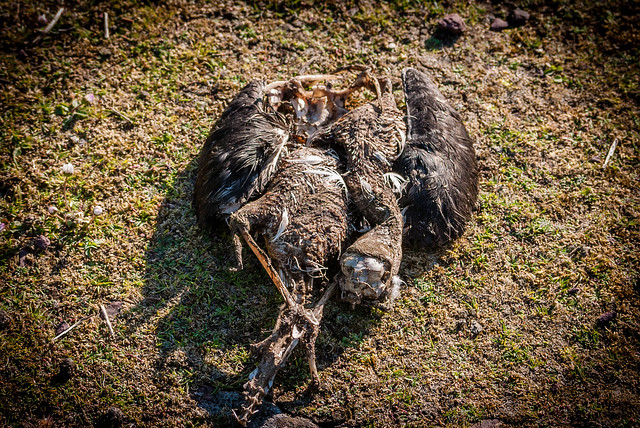
The following day, I find Richard and Giselle having lunch in the courtyard, which I take as an invitation to ask questions, something I’m trying not to do incessantly. But this one is important. I need to know if a Greater Black-Backed Gull could and would eat a Welsh faerie if the opportunity presented itself.
They blink at me. “A what?”
“A faerie.”
Richard’s face is a picture of disbelief. “I’m sorry, I’ve clearly not understood.”
“As in Tinkerbell?”
He stares at me a moment longer and then clearly decides that yes, I am actually asking the sea-bird expert about faeries. “I take it this is a hypothetical question?”
“Well, yes.”
He’s shaking his head but he’s answering, explaining that yes, the gull would be interested in faeries (“How big?”) and that it would separate one away from the others and herd it out to sea. Rather than attack outright, the gull would wait until the faerie was exhausted, and then swoop in for the kill. It would grip the faerie and shake him, rattling his bones until he was dead. It would drag the faerie through the sea, drowning if needed. The gull would then use the sea as its table and carefully disembowel the faerie before eating him whole.
“So like, with his little feet sticking up out of the gull’s beak?”
“Exactly,” said Richard.
“Perfect, thank you.”
He calls out after me. “This isn’t a children’s book, is it?”
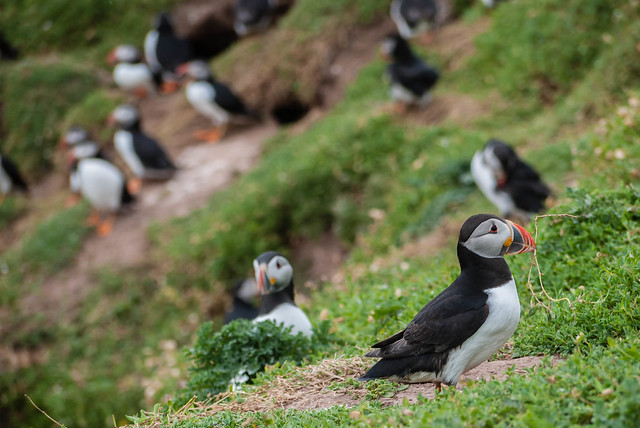
The last night on the island, Richard has a special treat for us. The night sky was dark, the moon just a sliver in the sky. It is bitterly cold and I’m wearing three layers; at least if I slip on the rocks, I will probably bounce. We walk with our flashlights to the west end of the island, down to a bay of sharp rocks, the Quarry. The others are solicitous, checking that I’m OK and taking my arm as we walk the narrow red-rocked path. I’m grateful for the help. Although I can’t see the sheer drop, I can hear the waves crashing against the rocks below. No helicopter would get to me here.
“Can you smell that oily, musty smell? That’s the smell of the storm petrel,” says Richard. He stops. “Listen.” We listen.
The air is filled with an unearthly, repetitive sound, almost like a loud purr echoing off the rocks.
“That’s the male, he’s singing.” Richard grins at me. “I’ve heard it described as the sound of a fairy throwing up.”
We find a flat rock as a perch and sit in the darkness. There’s a sense of movement, of flutters. A black feathered thing swoops directly past my head. I stare in the dark, trying to make sense of what is out there. Water lapping against the shore and the silky whoosh of wings and still the echos of that soft purring sound.
Richard brings out an infra-red viewer and everything is changed. There are birds everywhere, hundreds of them, flying all around us. “They come out most nights and eat plankton from the sea.”
“There’s so many, like moths,” says one of the other guests.
“Isn’t it amazing?” Richard turns to me. “Is this like your fairies?”
“Better,” I whisper. Maybe I only imagined the touch of feathers across my face. These birds of the night were nothing like the faeries of my stories but I could write different ones. Smaller, faster. Ethereal.
We sit in the dark for an hour, maybe more, watching the storm petrels fly. I would stay all night, if my bones weren’t beginning to ache with the cold. It’s midnight. Tomorrow morning I’ll be home.
Back in the room, I write under the covers with my flashlight. My trip is almost over. I did not write a million words, not even five thousand a day. I have an amazing gull-killing-faerie scene and the story to wrap around it. I have written almost 20,000 words, which is still a nice chunk to have in my pocket. I have a wonderful true horror story on a lighthouse to investigate. I’ve experienced something special, a quiet message just for me, if only I have the patience to listen.
In six hours, I will be up again, cleaning out my room. The Dale Princess will carry us all away. I stay awake in the dark, unwilling to let the magical evening end.
If you want to change the way you write, change the way you live.
One of the researchers asked me to tell her how to make Mars Bar brownies before I go. I listen to the shearwaters and storm petrels calling out under the stars.
I write the recipe. “First, you need an island…”
•••
Sylvia Spruck Wrigley was born in Germany and spent her childhood in Los Angeles. She emigrated to Scotland where she guided German tourists around the Trossachs and searched for the supernatural. She now splits her time between South Wales and Andalucia where she writes about plane crashes and faeries, which have more in common than most people might imagine. Her fiction was nominated for a Nebula in 2014 and her short stories have been translated into over a dozen languages. Her novella, Domnall and the Borrowed Child, is forthcoming from the Tor.com imprint in November 2015. You can find out more about her at http://www.intrigue.co.uk/

